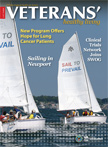VA New England Healthcare System
Exciting New Program Offers Hope for Lung Cancer Patients
A groundbreaking project is underway in the VA New England Healthcare System that has the potential to help cancer patients across the country. The new Precision Oncology Program (POP) is part clinical, part research, and initially involves Veterans with lung cancer.
“Lung cancer is the most common cancer in our network—averaging about 1,000 new patients diagnosed per year,” says Louis Fiore, MD, MPH, executive director of the Massachusetts Veterans Epidemiology Research and Information Center and program director of the Veterans Integrated Service Network 1’s (VISN 1) POP. “Nationally, the VA estimates the number of lung cancer patients at 7,500 and estimates the number of all VA cancer cases at about 40,0001 a year—so there is a potential to help many Veterans.”
 Dr. Fiore explains that the process begins with oncologists (doctors who specialize in treating cancer). “Oncologists and their lung cancer patients will discuss the program and determine together if it will help the patient. This isn’t a typical research program with a pre-set goal for the number of patients. We hope to test several hundred patients in the next six months, but we are very early in the process. However, all of the oncologists in the VA New England Healthcare System are aware of the program. Whether you are in Maine or Boston, we’re creating ways for everyone to participate.”
Dr. Fiore explains that the process begins with oncologists (doctors who specialize in treating cancer). “Oncologists and their lung cancer patients will discuss the program and determine together if it will help the patient. This isn’t a typical research program with a pre-set goal for the number of patients. We hope to test several hundred patients in the next six months, but we are very early in the process. However, all of the oncologists in the VA New England Healthcare System are aware of the program. Whether you are in Maine or Boston, we’re creating ways for everyone to participate.”
So what is POP? In simple terms, this cuttingedge program can help a Veteran based on specific genetic differences in a tumor. “Based on a tumor’s gene mutation,” says Dr. Fiore, “we know a patient may benefit from one type of treatment over another, which helps the oncologist provide better care. In other cases, the mutation may qualify a patient for clinical trials of experimental drugs.”
He added that drug companies are racing to develop new drugs that work with specific genetic sequencing, and that this project will give some Veterans an opportunity to participate in innovative trials they might not have access to otherwise. The results of clinical trials can go on to help many other Veterans.
In the future, a patient-centered website will give participating Veterans an opportunity to provide input that is critical to scientists. The hope is that many of these targeted drugs will offer a longer survival rate; if a drug works but isn’t improving a patient’s quality of life, scientists want to know that.
Although POP is starting in VISN 1 by working with lung cancer patients, it may later extend to other types of cancer in the network and ultimately to other VA regions. “It is just beginning here in VA New England, but we hope to roll it out nationally if it is as successful as we think it will be,” adds Dr. Fiore.
If you are interested in learning more, talk to your local VISN 1 provider,
call 1-857-364-3387, or visit http://www.newengland.va.gov/research/
precisiononcologyprogram

















